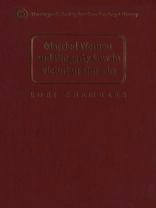Until this century, married women had no legal right to hold, use, or dispose of property. Since the ownership of property is a critical measure of social status, the married women”s property acts of the nineteenth century were important landmarks in the legal emancipation of women. Reform campaigns represented the first organized attempts by women in Upper Canada to challenge their status in society. Ironically, emancipation was not the first goal of reformers: their demands reflected a concern with protection from economic instability. The laws granting women new rights and privileges were designed to force men to behave more responsibly and to mitigate the worst hardships imposed upon wives by abusive or negligent husbands.
The most detailed and complete account of married women”s property law reform yet written for any North American jurisdiction, this fascinating study will be of interest to those in the areas of law, women”s studies, and nineteenth-century social history.












